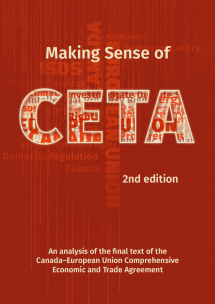Ideas into movement
Boost TNI's work
50 years. Hundreds of social struggles. Countless ideas turned into movement.
Support us as we celebrate our 50th anniversary in 2024.

Important decisions on the European-Canadian free trade agreement CETA will shortly be taken on EU institutional and Member State level. On this occasion, Canadian and European experts of civil society shed light on the most controversial aspects of the agreement. They conclude that CETA in its present form threathens public welfare on both sides of the Atlantic, referring among other areas to investor-state dispute settlement, agriculture and energy policy.

“In CETA, the controversial investor-state dispute settlement mechanism is preserved: investors still receive far-reaching rights to challenge policy measures that could possibly harm their investment”, explaines Peter Fuchs (PowerShift). “Some procedural modifications do not change the very vague and extremely dangerous legal concepts in CETA’s investment protection chapter at all. In addition, up to 42,000 US corporations with substantial business activties in Canada could already use CETA’s investment protection regime to challenge European environmental oder social policies.”
“The ratification of CETA would be a severe setback for efforts to encourage non-industrial farming practices and sustainable agriculture on both sides of the Atlantic and for fair prices for producers instead of dumping export prices“, stresses Berit Thomsen, trade policy officer at AbL.
“CETA will undermine sustainable energy and climate policy in the future. Efforts to stop fossil fuel-based energy production and promote renewable energy will the threatened by CETA, which poses an immense danger to any measures put in place to reach the goals that the EU and Canada agreed to in the 2015 Paris Agreement”, trade policy expert at BUND Ernst-Christoph Stolper explaines.
The publishing organizations call for an immediate halt of the CETA negotiations and the ratification process.
Publishing organisations:
Arbeitsgemeinschaft bäuerliche Landwirtschaft (AbL), AK Wien, AITEC, ATTAC Deutschland, ATTAC Österreich, Bund für Umwelt und Naturschutz Deutschland (BUND), Campact, Forum Umwelt und Entwicklung, Katholische Arbeitnehmer-Bewegung (KAB), Lobby Control, Mehr Demokratie e.V., ÖGB (Austrian Trade Unions Federation), PowerShift, Umweltinstitut München, Compassion in World Farming, Corporate Europe Observatory, Ecologistas en Acción, Global Justice Now, Institute of Global Responsibility, Mouvement Ecologique, Natufriends Greece, EPSU, FFII, Fairwatch, Progressi, S2B Network, SOMO (Centre for Research on Multinational Corporations), TNI, War on want, and the Canadian Centre for Policy Alternatives
Seven years after negotiations began on the EU–Canada Comprehensive Economic and Trade Agreement (CETA), political leaders appear finally ready to sign the deal at a ceremony in Brussels in October. Much has changed since then. For Europe, CETA started as a low-profile agreement with broad, if mostly disinterested, political support. It is now the target of a resurgent progressive coalition of social justice groups, environmental organisations and labour, who perceive the deal, correctly, as a threat to democracy on both sides of the Atlantic. Public opinion has also shifted, with many Europeans now keenly aware of the broad similarities between the imminent CETA and the politically toxic Transatlantic Trade and Investment Partnership (TTIP).
The concurrent challenges of climate change and extreme inequality have shattered political illusions about the sustainability—social and environmental—of our current economic model. European and Canadian trade policy, with its priority on market openness, export-led growth, corporate profits, deregulation and special privileges for investors, was and remains an attempt to legally disqualify alternatives to free-market globalization. CETA would transform and weaken the capacity of governments to respond to economic, social and environmental challenges at precisely the moment when responsiveness and innovation in public policy are needed most.
In September 2014, the Canadian Centre for Policy Alternatives and German NGO PowerShift co-published an analysis of the final draft CETA text under the title ‘Making Sense of the CETA.’
This new edition analyses the final legal text of CETA as made available in February 2016, and is the most comprehensive independent review of the agreement to date. It finds that, more than just a trade deal, CETA is a sweeping constitution-style document restricting public policy options in areas as diverse as intellectual property rights (copyright, trademarks, patents and Internet governance), government procurement, food safety, financial regulation, the temporary movement of workers, domestic regulation and public services, to name just a few of the topics explored in this analysis.